The rom-com is much maligned, but when done well, it’s a movie that simply…sparkles.
A good romantic comedy is the cinema’s equivalent of an SSRI; it will instantly uplift your mood, without the nasty side effects.
Notting Hill, written by Richard Curtis, and starring Hugh Grant and Julia Roberts, is such a romantic comedy. Eleven years after its release, it’s as charming as ever. I suspect that like Back to the Future, it will stand the test of time.
There are many reasons for Notting Hill’s timelessness. Part of it has to do with the timelessness of the humor. Very little of the comedy is reliant upon cutting edge pop culture references.
Part of it has to do with Notting Hill’s structure–it’s extremely solid, and well-worth analyzing even if you have no aspiration to write a romantic comedy.
Finally, Notting Hill is timeless because it takes the tropes found in many a romantic comedy, and specifically tweaks them so that they become unique to the world Curtis created, the world in which an average bloke can win the heart of a major movie star.
Curtis is notorious for being a perfectionist, as you can see from this anecdote provided by Hugh Grant.
“During the lowest ebbs of shooting Four Weddings and a Funeral, Richard Curtis used to cheer me up by talking about the new film he was hatching, and what funny scenes he’d already thought up for me.
And in the years that followed, as I sat around flicking the pages of Congo II and thinking ‘maybe there is something here,’ the only thing that kept me from signing on the dotted line was the thought that Richard’s new script was just around the corner. It never was.
Never has a human being taken longer to write a perfectly straightforward romantic comedy. Some call it perfectionism. I called it sloppy and sent him angry faxes urging him to drop Rowan Atkinson, The Vicar of Whatsit, his own children, and the world’s starving…and concentrate on me.”
With so many drafts ostensibly written during those several years, you’d think I’d be able to find at least one of them floating around, but I was able to uncover only two drafts of the screenplay–one on the internet which deviated from the movie perhaps a total of three times.
The other was the official published version of the script, nicely bound and published by Hodder & Stoughton. While the book provided some lovely tidbits (Hugh Grant’s Congo story being one of them), the script in the book seems to have been written to reflect the way the movie was eventually cut…and as such, doesn’t reveal any screenplay vs film screenwriting tips.
Nevertheless (is this the only screenwriting blog that uses terms like nevertheless?), there’s plenty to learn from this standout romantic comedy, which proves that rom-coms can be both romantic and funny…without being the least bit insipid.
Notting Hill doesn’t have the sly wit which abounds in Curtis’s Four Weddings and a Funeral, but is full of the endearing charm which makes his other Hugh Grant film, Love, Actually, such a perennial holiday favorite–and a candidate for a future Screenplay vs Film post, (which will most likely be written closer to Christmas).
Below are screenwriting tips learned not by comparing Notting Hill’s screenplay with its movie, but just by examining the movie itself. A lot of the tips are applicable to any kind of comedy, not just the rom-com, although a few of them are specific to the romantic comedy genre.
Since there are nine tips, and since the internet has reduced everyone’s attention span, I’ll be splitting this post into two parts (regular readers, you know the drill!). So now onto the first set of screenwriting tips I learned by studying Richard Curtis’s quietly brilliant Notting Hill:
Screenwriting Tip #1: Humor lies in specificity
Jokes are almost always funnier the more specific you are. There’s a great scene in Notting Hill where Hugh Grant’s character, William, meets mega-star Anna Scott (played by mega-star Julia Roberts) in his bookshop.
They’ve had an awkward, but amusing, conversation about a travel guide to Turkey, when he spots a customer in the back of the bookshop, stuffing a book into his pants. William leaves Anna to confront the thief:
WILLIAM
We’ve got a security camera in this bit of the shop.
THIEF
So?
WILLIAM
So, I saw you put that book down your trousers.
THIEF
What book?
WILLIAM
The one down your trousers.
THIEF
I haven’t got a book down my trousers.
WILLIAM
Right–well, then we have something of an impasse. I tell you what–I’ll call the police–and, what can I say? If I’m wrong about the whole book-down-the-trousers scenario, I really apologize.
THIEF
Okay–what if I did have a book down my trousers?
WILLIAM
Well, ideally, when I went back to the desk, you’d remove the Cadogan Guide to Bali from your trousers, and either wipe it and put it back, or buy it. See you in a sec.
Richard Curtis just could’ve had William say “ideally, when I went back to the desk, you’d remove the travel guide from your trousers, and either wipe it and put it back…” and this mildly humorous interlude still would have been funny. (It plays out a lot better on screen than on the page, largely due to the scruffy actor who plays the thief.)
By specifically choosing a title, Curtis made the scene a lot funnier, because he increased its absurdity–out of all the travel books in the world, why stuff the Cadogan Guide to Bali down your pants? For more ways to increase the humor of a scene, check out How to Write a Comedy Script: Screenwriting Tips from the Hangover.
When you’re writing your own screenplay, sometimes you’ll naturally include specific references. Other times, usually, when you’re quickly pounding out a scene, you’ll use generic terms. After you’ve completed your first draft, look for these missed opportunities to subtly increase the humor of your scenes by replacing generic references with specific ones (but don’t go overboard with the pop culture stuff. Carrie Bradshaw shoe jokes are so 2002).
Screenwriting Tip #2: The importance of obligations
The obligation pays a pivotal role in showing the development of a bond between two characters. Basically, two characters are forced to spend more time together because one of them, let’s call him character A, has an obligation that he has to meet.
This obligation usually involves character A’s family or work colleagues, some with very strong personalities who do not hesitate to make their opinions known. It makes for a less than ideal situation for character B, because she’s thrust into this new world where her every move is put under a microscope.
However, it’s a perfect situation for your screenplay, because it’s ripe with potential conflict, of the comedic or dramatic variety. As the the evening wears on, the conflict will have brought your characters closer together, or driven them further apart.
The best thing about the obligation is that it’s so natural. Character A can’t get out the obligation, so naturally, character B has to tag along. Presto! You have a scene which meets your screenwriting objectives (showing a developing bond between A and B; introducing A’s world to B as well as to the audience) without it seeming too contrived.
Let’s look at Notting Hill as an example. After going through an excruciating press junket where William pretends to be a reporter from Horse and Hound, he finally scores some private time with Anna, who tells him that she’s canceled her plans to spend time with “Britain’s premier equestrian journalist.” Will is overjoyed…but then he remembers that tonight is his sister’s birthday party. An obligation he can’t really get out of, although he says he can.
Anna says she’ll join him. Voila! It’s actually the perfect first date setting for this screenplay. Will’s friends are a close-knit, funny bunch, providing the audience with lots of laughter, and providing Anna with a taste of what non-celebrity life is like. Their relationship deepens as they both face the intense scrutiny of Will’s friends.
If you’re looking for a way to get your characters’ worlds to collide and to provide a setting where they can get to know one another better, see if incorporating a family or professional obligation into your script does the trick. If done well, it can cover a lot of screenplay ground without seeming too manufactured.
Screenwriting Tip #3: Cooking catastrophes are always funny
Food, oddly enough, usually has a lot of comedic potential. Slipping on a banana peel is a cornerstone of slapstick comedy, while ruining a very important meal also forms the basis of many a comedic scene.
In Notting Hill, what people do and don’t eat contributed to some lighthearted moments. Here are two of my favorites. The first one involves Spike:
Spike comes out of the kitchen, eating something white out of a styrofoam container with a spoon.
SPIKE
There’s something wrong with this yogurt.
WILLIAM
It’s not yogurt–it’s mayonnaise.
SPIKE
Well, there you go.
(takes another big spoonful)
On for a video fest tonight? I’ve got some absolute classics.
This one centers around the fruitarian, with whom Will has been set up:
INT. MAX AND BELLA’S KITCHEN/CONSERVATORY – NIGHT
Max walks over to the table. Honey, Bella, William and another girl.
MAX
Keziah — some woodcock?
KEZIAH
No, thank you–I’m a fruitarian.
MAX
I didn’t realize that.
It is left to William, who has been set up here, to fill the pause.
WILLIAM
And ahm–what’s a fruitarian exactly?
KEZIAH
We believe that fruits and vegetables have feelings so we think cooking is cruel. We only eat things that have actually fallen from the tree or bush– that are, in fact, dead already.
WILLIAM
Right. Right. Interesting stuff.
(pause)
So these carrots…
KEZIAH
Have been murdered, yes.
WILLIAM
Murdered? Poor carrots. How beastly.
Ruining a good meal plays a vital role in another romantic comedy partially penned by Richard Curtis, and that is the infamous “blue soup” created by Bridget Jones.
Thankfully, her romantic interest, the dashing Mark Darcy, rescues the meal somewhat by preparing at least one edible item (an omelet), creating a scene which is both romantic and comedic. I’d post a clip, but couldn’t find one on YouTube! If anyone finds it, please say so in the comments.
Screenwriting Tip #4: The third wheel makes for a very good surprise
The love triangle has been a key component in romantic stories for eons. One of the oldest and most popular is the one found in the King Arthur legend, which was rather underutilized in the historical epic King Arthur. In contrast, the love triangle played a key role in keeping Anna and Will apart–and best of all, it was an unexpected surprise.
After a lot of awkward banter, an even more awkward press junket, and a family + friend inquisition, Anna invites Will up to her room at the Ritz. She enters the hotel first, and asks him to follow in five minutes. It seems like their relationship is going to go to the next level, but when Will arrives at her suite, he discovers that Anna is not alone.
She has been joined by her on-again, off-again boyfriend, another famous actor (played to perfection by Alec Baldwin) who mistakes Will for a waiter and asks the shocked & confused Will to “adios the plates.”
Anna’s boyfriend was not just a major surprise for Will–it was a surprise to the audience too, which took this boy-meets-girl story into an entirely new direction. We never did see Alec Baldwin again, but his cameo created maximum impact and was a huge obstacle to Anna and Will’s relationship.
Wedding Crashers is another movie in which we unexpectedly encounter a “third wheel.” Owen Wilson’s character has fallen hard for Rachel McAdams, and over the course of the first act, we’ve become invested in their relationship–only to discover to our surprise (and Owen’s), that Rachel is seriously dating Bradley Cooper.
Unlike Alec Baldwin in Notting Hill, Cooper’s character plays a very active role in keeping Owen and Rachel apart. However, both actors’ surprise entrance packed quite the punch.
You’d think that the love triangle concept would get old, but it is, in fact, timeless. If you’d like to make use of the love triangle in your own romantic comedy, I think the best way to go about it is to first show the chemistry between the two main characters. Make the audience invested in their relationship–and then tear your love birds apart by introducing the third “angle” of your love triangle.
You have to be careful though with how you introduce the third person to your screenplay. In Notting Hill, it could seem like Anna was leading Will on, but she explained to him that she thought her volatile relationship with the major superstar was over, and that she was unsure he’d ever be flying in to see her again. The entrance of the third person in your triangle can create a welcome surprise which prevents your screenplay from dragging, but make sure that entrance is believable and authentic to the story.
Blue door by Nick
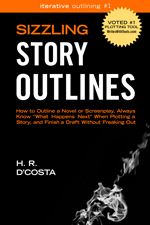

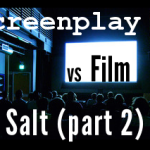

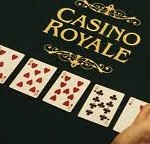




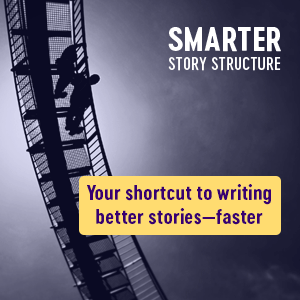

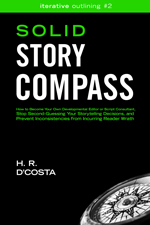
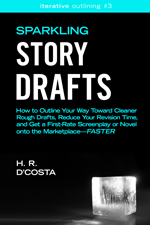
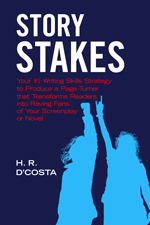
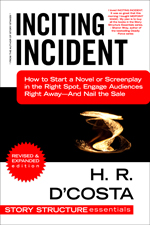
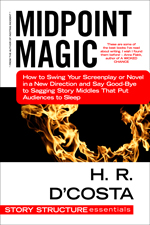
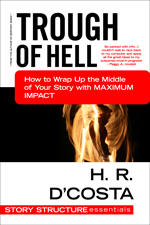
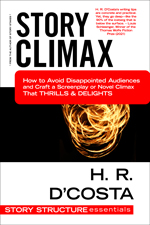
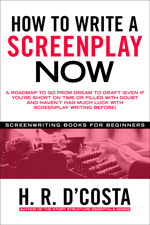
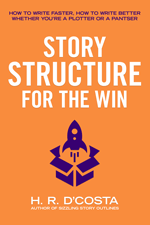

Comments on this entry are closed.
Hi, Having done UCLA professional writing course and after reading piles of books on screenwriting I thought I had pretty much heard everything. But this site was a major surprise. I want to thank you for some excellent tips and pointers. I especially love the screenplay vs. movie feature and didn’t know how useful it was to compare the two. Thank you and keep up the good work please.
Hi Abhi,
Thanks for visiting Scribe Meets World. I’m so glad you’ve found it helpful. I thought “screenplay vs film” would give the site a different angle from all the other how-tos out there.
If you’ve taken an UCLA class, you’ve been really dedicated in your pursuit of studying screenwriting.
One book that I’ve found to be incredibly useful (but not so well known as some of the others) is Hal Ackerman’s Write Screenplays That Sell: The Ackerman Way. Check it out sometime!
If there are any movies you’d like to see analyzed on the site, (perhaps another romantic comedy?), please let me know!
Hi, Thanks for your kind reply. I have read Hal Ackerman’s book. Will certainly check out industry insider contest.
I am not sure if it was clear from my id but I reside in India. I have just begun to work with some people in Bollywood. For the first time, after about 6 years of trying, I have managed to get paid for my work, though I might still be a bit far from seeing it on the screen.
My comments below Notting Hill were incidental (although I like the movie and your analysis of it). I like ALL of your site esp. your screenplay vs movie section.
I just finished writing a kind of retro-futuristic movie and was pretty happy about it till I read something on your site which I thought would make some scenes even better (damn!). Thanks a lot for some extremely good insights.
Looking forward to seeing more, a lot more, stuff from you. Thanks again.
Hi Abhi,
If you’ve already read Ackerman’s book, you’re more ahead of the game than I realized!! Definitely check out the Industry Insider contest. I didn’t realize you live in India — but the contest IS open to international citizens.
That’s wonderful that you’re finally getting paid for your work. There’s no better feeling than to be paid for your writing–except perhaps to see your screenplay on the the big screen. I get the feeling that this is just around the corner for you. Keep on being persistent–and all your hard work will pay off. With rare exception, when you look behind the scenes, every writer who’s been an “overnight success” has really been working at it for years and years.
I wonder what I wrote which made you re-evaluate your retro-futuristic movie…but if you think these changes will strengthen your script, it’s well worth the effort. I’ve always found I feel better after improving a draft I thought I was done with, even though initially, I feel very reluctant to embark on an overhaul (minor or massive).
I know I haven’t posted in a while, but more articles are definitely coming!
I second Abhi’s statements. I stumbled upon this site last month and I’m slowly, but surely, working my way to the older entries.
Thank you very much, the advice has made the next script a lot less daunting. 🙂
Thank you for very good lessons……